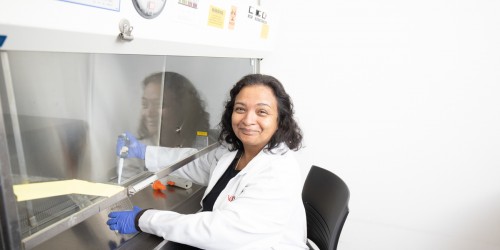
Developing innovative methods to improve healthcare
Lucy alumna Dr Soma Sengupta describes her groundbreaking research in neuro-oncology
Alumna Julia Koziel describes the highlights of her career, from game-like apps to neuroimaging data
I decided to study Psychological and Behavioural Sciences (PBS) because of my genuine interest in the human brain. Furthermore, the course allowed me to combine the methodology from both humanities and sciences. As a PBS student, I was writing many (one would say too many) essays while at the same time attending practical lab classes with NatSci students, solving statistical worksheets or looking at skulls of our ancestors in biological anthropology seminars. Studying a combination of various disciplines, with the overarching focus on the human species and the mind, allowed me to expand my interests, as well as my skill set.
When I received my offer to study at Lucy, I had very mixed feelings and did not know what to expect However, after my first few months I was pleasantly surprised. Lucy is such a welcoming, international community filled with smart, talented people. Everyone I met there surprised me with their life stories, creativity, passion and great spirit. Hence, I wanted to be actively involved in college life and acted as an International Officer in the Student Union and rowed in the college team. However, most importantly I made amazing friends for life who became my family whilst Lucy became my home.
My course at Cambridge University helped me to understand what science is actually about. Apart from problem-solving and analytical skills, you need to be creative and work well in a team. I enjoyed all of these elements and was very passionate about cognitive neuroscience. So, I applied to work in a research lab at King's College London.
My research team is based at the Institute of Psychiatry, Psychology and Neuroscience and investigates neurodevelopment with the focus on heterogeneity of autism. This means that we don't want to simply group all autistic individuals and understand what makes them different from typically developing people. Instead, we strive to understand different symptoms and therefore, different needs within autism. We work closely with so called A-reps, who are highly functioning autistic people. They help us realise what is missing in our research but is in fact important to the autistic community.
My career allows me to grow in a multitude of ways. In the past six months, I learnt how to design tablet game-like apps, spoke to many parents of autistic children and became aware of their daily struggles and collected data that looks at our brain waves or brain structure (so called neuroimaging data). All of these elements make it varied and therefore, exciting. However, most importantly, this career taught me that neurodiverse individuals need to be acknowledged by society and their needs should be met. Every day, I am happy to be a part of this research team because I know it is bringing the field of neuroscience one step closer to understanding the neurodiversity of autism and therefore, making our society more accepting of people with this condition.
You should definitely decide to go into a field of academia that really excites you. This makes your everyday work a fun rather than tedious activity.
The world of academia and research is filled with talented individuals. Hence, you frequently need to refine your skills to stay on the similar level to other research workers. If you don't have the drive to do so, you may find the career too demanding.
About Julia Koziel
Julia is a Research Assistant at the Institute of Psychiatry, Psychology & Neuroscience (IoPPN), a Faculty of King's College London in the Department of Forensic & Neurodevelopmental Sciences. The institute is Europe's largest centre for research and postgraduate education in psychiatry, psychology, basic and clinical neuroscience. She is currently working with AIMS-2-TRIALS (Autism Innovative Medicine Studies-2-Trials) a research programme that explores the biology of autism to tailor treatments and develop new medicines.

Lucy alumna Dr Soma Sengupta describes her groundbreaking research in neuro-oncology

Amber is Research Associate at the Autism Research Centre, Dept of Psychiatry and launched the network with her colleague Julian Tillmann, a Research…